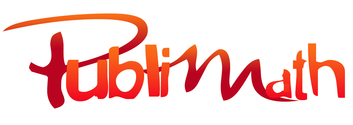Expressions. N° 35. Histoire et philosophie des sciences. p. 23-38. Eclairage cognitif sur la complexité des différents systèmes de numération.
Une version texte intégral est en téléchargement sur le site Bibliothèque numérique des IREM et de l’APMEP Télécharger
Auteur : de Viviés Xavier
Résumé
Dans cet article, l’auteur développe une analyse des systèmes de numération, basée sur leur plus ou moins grande compatibilité avec les fonctions cognitives. Dans une première partie, il définit une taxonomie permettant de catégoriser tous les systèmes de numération en fonction de différents niveaux de propriétés. Dans une seconde partie, il montre comment ces différents éléments taxonomiques interagissent avec certaines particularités du raisonnement naturel, mises en évidence par la psychologie cognitive. Abstract There are many ways of approaching Husserl’s philosophical works and
it is most usual to start with those of his mature period. One is then confronted with notions specific to his philosophical thought enhanced by a technical terminology linked to his desire for accuracy in the expression of ideas (epoche, phenomenological reduction, eidetic knowledge, intentionality, noeme-noese, etc.) In a first attempt to approach Husserl, it may be wise to follow him step by step in his initial research about the essence of number. It means then « going back to what constitutes the thing itself » and examining it until reaching « the primeval evidence » which helps understand the logical and psychological possibility to construct it. If the « class » that constitutes the number stems from experience, it will be wrong to reduce it entirely to its sensitive characteristics. The « cardinal mistake » of empiricism consists in wrongly reducing the numeric given to the empirical one. The number involves a « collective linkage » which requires an actual construction work.
Notes
Article du numéro 35 de la revue Expressions.
Données de publication
Éditeur IUFM de la Réunion Saint-Denis , 2010 Format A5, p. 23-38 Index Bibliogr. p. 37-38
ISSN 1769-7107
Public visé chercheur, enseignant, formateur
Type article de périodique ou revue Langue français Support papier
Classification
